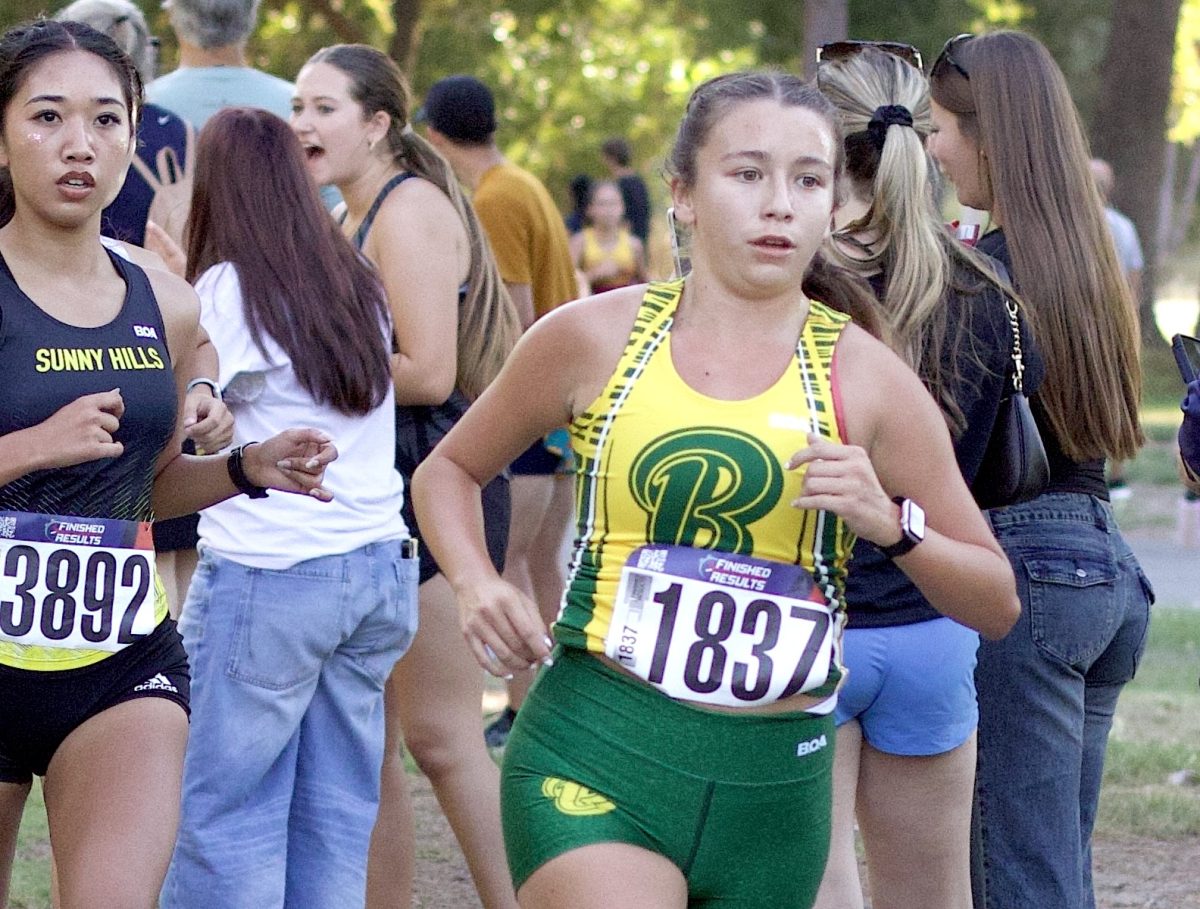For the earliest arrivals at BOHS each morning, it is common to spot members of the boys’ and girls’ cross country teams running around the surrounding neighborhoods and up and down steep Wildcat Way.
It’s part of a grueling daily routine for Wildcat runners that forces them to exert themselves to their physical, and mental, limits.
But there’s an upside to the pain: The exertion instills the self-discipline for Wildcat runners to push themselves in other areas of life as well. Because enduring that momentary pain — a skill many long-distance runners have mastered — is where the most substantial growth occurs.
Matthew Choi (’25), boys’ varsity cross country co-captain, wakes up at 5:20 a.m. each morning for a seven-mile run. “I know that if I can get done with seven miles, then I can easily get done with [an] assignment, easily do this chore, [and other] certain tasks,” Choi said.
For student athletes like Choi, cross country is: running extreme distances on the hottest days of the year; arduous workouts of “tempos” and “repeats” and “strides”; frequently added mileage, further pushing the athlete to their limits; and ever steeper hills.
By not succumbing to the chronic discomfort, runners make incremental improvements each day.
Pamela Valenti, girls’ varsity cross country coach, reminds her runners to “take care of the little things,” like making sure they eat, get enough sleep, and hydrate.
The most obvious benefit of long distance cross country running is physical. The sustained nature of long-distance running improves an athlete’s cardiovascular system, reinforces the ligaments around their joints, strengthens their lungs, and helps them maintain a healthy weight. These significantly decrease their risk of developing many common health issues, such as diabetes, strokes, and bone fragility.
But long-distance running is more than just a physical feat.
“Running is mental, [so] once you hit that mental block, it’s hard to recover, but you’ve just got to tell yourself it’s going to be okay and keep pushing,” Mia Luna (‘26), girls’ varsity cross country co-captain, said.
Long distance runners compete in a sport based solely on their own individual effort and time. Captains Luna and Choi can recite their three-mile personal records (PR) off the top of their heads (18:52 and 16:10, respectively).
That a runner cannot hide their shortcomings — they’re right there in the times or failing to place in an invitational — opens them up to more explicit critiques and criticism from coaches and fellow runners. Which, ultimately, is a good thing. Being in an environment with constant individual feedback teaches runners to accept constructive feedback without letting the words damage their self-esteem. They develop a thick skin, a skill that proves useful in the classroom, workplace, and social environments.
Perhaps more importantly for teenagers and their developing brains is that running is beneficial for mental health.
For girls’ varsity cross country co-captain Sarah Garrigue (‘26), the sport has taught her “how to be a better person to everyone else.”
Running increases blood flow which delivers nutrients the brain needs in order to function properly. For example, the exertion from running increases the depth and capacity of long-term memory. This exercise also decreases the number of stress receptors in the brain, minimizing the effect of stress hormones, resulting in relief from the feelings of tension and anxiety in the mind.
In a 2020 study by the National Library of Medicine, 96 percent of respondents reported improved mental and emotional health from running.
“Sometimes when I feel overwhelmed with stress, I will run around my neighborhood and it will help me relieve my stress and make me more focused,” Issabella Garcia (‘27), varsity cross country runner, said. “While I run, I still feel the pain of running, however, the pain subsides because I go into a relaxed mental state. I feel good after my runs.”
Research also reveals that running improves sleep quality, which allows the body to recover, stay attentive in class, and decrease anxiety. This enhances productivity, lengthens attention spans, and boosts academic performance.
For the runners on the BOHS cross country team, there is another mental health benefit: happiness.
Running stimulates the release of endorphins, which are received in the brain as a feeling of relaxation and contentment, known as “runner’s high,” a phenomenon some BOHS cross country runners have experienced firsthand.
The happiness also derives from the camaraderie of being a part of a team, particularly a team that bonds during punishing workouts
“My experience has been really fun. I actually get close with my teammates, and you get to push each other more, talk to each other more, make friends, and make new connections,” Garcia said.
Cross country runner Karen Jimenez (‘28) said, “[Cross country] makes me happy because I run with my friends (and the pasta parties are really fun, too).”
The goal of a cross country athlete is always to improve, defeat the rival team, advance to CIF, and ultimately, be the best version of themselves. While there are obvious physical benefits to running, the non-obvious benefits of discipline, mental acuity, and camaraderie compel the student athlete to excel far beyond the race course.











Adeline Robertson • Oct 9, 2024 at 8:41 pm
Awesome article, Charlotte!
Sam Barrett • Oct 4, 2024 at 11:07 pm
Beautifully written!
Paul • Sep 22, 2024 at 3:31 pm
Wonderful article!
Jacquelyn Nethers • Sep 21, 2024 at 3:43 pm
Well written, Charlotte. It’s cool to see your own personal hard work as a XC runner translate over into the hard work of becoming a skilled writer. Keep it up!
Lilly Nguyen • Sep 21, 2024 at 2:59 pm
Great job on the article Char!!
Cory N • Sep 21, 2024 at 2:52 pm
Very well written article! I learned something new: the impact running can have on long term memory! Great work!
Jimme • Sep 21, 2024 at 2:46 pm
Charlotte well researched and great use of quotes from fellow team mates. Keep on enjoying what you do. Pops
Mrs. Robertson • Sep 21, 2024 at 12:50 pm
Great job, Charlotte! I appreciate how you dug into the science behind the health benefits. Very informative!
Kristine Nethers • Sep 21, 2024 at 12:33 pm
Great article on the multiple benefits of running (physical, mental, emotional & relational).
Mrs. Hambelton • Sep 21, 2024 at 12:30 pm
Outstanding article, Miss Nethers! You make excellent points that I hadn’t considered before. Thank you!
Kasey Philyaw • Sep 21, 2024 at 12:26 pm
Such a great article. I love the attention given to sleep and endorphins… along with happiness!
Michele Green • Sep 21, 2024 at 12:25 pm
Great read! Good article Charlotte
Jane Nethers • Sep 21, 2024 at 12:20 pm
Charlotte, that was very well written! Great job! Mimi
Megan • Sep 21, 2024 at 12:15 pm
Great article! I find the hardest mental challenge with exercise for me, is knowing when to rest and listen to what my body needs at different times. While I wish I could run 7 miles a day, being kind to myself and not stressing when my bodies cycles & when I need to alter my routines, has been my biggest challenge! along with honoring the strength that comes from stillness. Keep it up ♀️
Tristyn I • Sep 21, 2024 at 12:07 pm
I liked the combination of hearing the runners thoughts combined with the science. Well written!